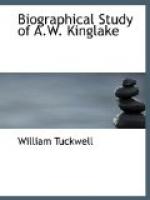Alexander William Kinglake was descended from an old Scottish stock, the Kinlochs, who migrated to England with King James, and whose name was Anglicized into Kinglake. Later on we find them settled on a considerable estate of their own at Saltmoor, near Borobridge, whence towards the close of the eighteenth century two brothers, moving southward, made their home in Taunton—Robert as a physician, William as a solicitor and banker. Both were of high repute, both begat famous sons. From Robert sprang the eminent Parliamentary lawyer, Serjeant John Kinglake, at one time a contemporary with Cockburn and Crowder on the Western Circuit, and William Chapman Kinglake, who while at Trinity, Cambridge, won the Latin verse prize, “Salix Babylonica,” the English verse prizes on “Byzantium” and the “Taking of Jerusalem,” in 1830 and 1832. Of William’s sons the eldest was Alexander William, author of “Eothen,” the youngest Hamilton, for many years one of the most distinguished physicians in the West of England. “Eothen,” as he came to be called, was born at Taunton on the 5th August, 1809, at a house called “The Lawn.” His father, a sturdy Whig, died at the age of ninety through injuries received in the hustings crowd of a contested election. His mother belonged to an old Somersetshire family, the Woodfordes of Castle Cary. She, too, lived to a great age; a slight, neat figure in dainty dress, full of antique charm and grace. As a girl she had known Lady Hester Stanhope, who lived with her grandmother, Lady Chatham, at Burton Pynsent, her own father, Dr. Thomas Woodforde, being Lady Chatham’s medical attendant. {2} The future prophetess of the Lebanon was then a wild girl, scouring the countryside on bare-backed horses; she showed great kindness to Mary Woodforde, afterwards Kinglake’s mother. It was as his mother’s son that she received him long afterwards at Djoun. To his mother Kinglake was passionately attached; owed to her, as he tells us in “Eothen,” his home in the saddle and his love for Homer. A tradition is preserved in the family that on the day of her funeral, at a churchyard five miles away, he was missed from the household group reassembled in the mourning home; he was found to have ordered his horse, and galloped back in the darkness to his mother’s grave. Forty years later he writes to Alexander Knox: “The death of a mother has an almost magical power of recalling the home of one’s childhood, and the almost separate world that rests upon affection.” Of his two sisters, one was well read and agreeably talkative, noted by Thackeray as the cleverest woman he had ever met; the other, Mrs. Acton, was a delightful old esprit fort, as I knew her in the sixties, “pagan, I regret to say,” but not a little resembling her brother in the point and manner of her wit. The family moved in his infancy to an old-fashioned handsome “Wilton House,” adjoining closely to the town, but standing amid spacious park-like grounds, and inhabited in after years by Kinglake’s younger




